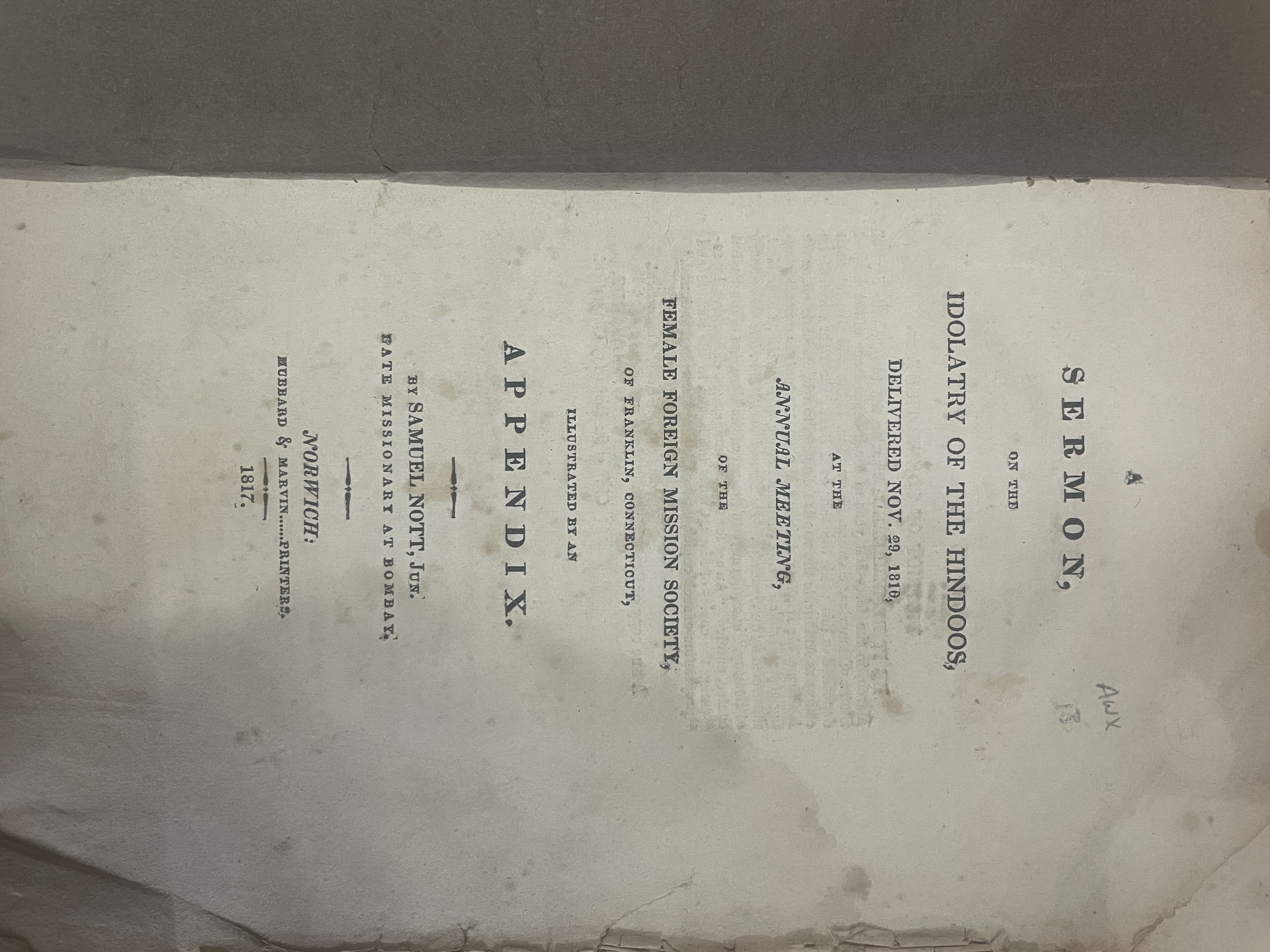A Sermon on The Idolatry of The Hindoos

About
Summary
Exquisite
TOC
Details
Related
URL
Images
Overview
A Sermon on the Idolatry of the Hindoos was delivered on November 29, 1816, by Samuel Nott at the Annual Meeting of the Female Foreign Mission Society of Franklin, Connecticut.
It appears that Samuel Nott Jr. also wrote a sermon with a similar title, A Sermon on the Idolatry of the Hindoos.
To provide a comprehensive summary, I will proceed under the assumption that both sermons share similar themes and objectives, focusing on the portrayal of Hinduism and its perceived issues by missionaries in the early 19th century.
Importance of Book
Missionary Advocacy: These sermons served as a call to action for missionary work in India, rallying support and funding from Western audiences.
Shaping Western Perceptions: They played a significant role in shaping Western perceptions of Hinduism and Indian society, often emphasizing the negative aspects to build a case for conversion.
Justification for Colonialism: By portraying Hinduism as a morally corrupt and idolatrous religion, such sermons could be used to justify colonial intervention and the imposition of Western values.
Key Themes
Idolatry: The central theme was the condemnation of Hindu idol worship as a false and immoral practice.
Social Evils: The sermons likely highlighted perceived social evils within Hindu society, such as caste discrimination, the degradation of women, and superstitious beliefs.
Moral Depravity: Hinduism was portrayed as a religion that led to moral depravity and lacked a proper understanding of God and morality.
Need for Conversion: The sermons emphasized the need to convert Hindus to Christianity to save them from their idolatrous ways and improve their lives.
Cultural Significance
Missionary Discourse: They represent a genre of missionary literature that aimed to promote Christianity and denigrate other religions.
Orientalist Representations: The sermons reflect Orientalist tropes that exoticized and Othered Asian cultures, portraying them as inferior to the West.
Colonial Ideology: They contributed to the construction of a colonial ideology that justified Western dominance and intervention in India.
Effects on Society
Reinforcing Negative Stereotypes: The sermons reinforced negative stereotypes about Hinduism and Indian society in the West, contributing to prejudice and discrimination.
Motivating Missionary Activity: They motivated missionaries to travel to India and attempt to convert Hindus, leading to cultural clashes and social disruption.
Influencing Colonial Policy: The negative portrayal of Hinduism may have influenced British colonial policy, contributing to interventions in Indian religious and social practices.
Hindu Responses: They elicited responses from Hindu reformers who sought to defend their religion and counter the negative stereotypes perpetuated by missionaries.
Conclusion
It is important to note that these sermons offer a biased and limited view of Hinduism, reflecting the perspectives and agendas of early 19th-century missionaries. They do not provide an accurate or comprehensive representation of Hindu beliefs and practices.
While these sermons aimed to condemn and convert, it's important to consider modern perspectives that emphasize interfaith dialogue, cultural understanding, and respect for diverse religious traditions.
The use of religious beliefs to justify social and political agendas is a recurring theme, and understanding these historical sermons provides insight into those dynamics.
Ultimately, the impact of works such as "A Sermon on the Idolatry of the Hindoos" lies in their ability to shape perceptions, influence actions, and contribute to the complex interplay of cultures and religions in a colonial context.
Table of Content
Absence of religious and social liberty.
Perverted standards of conduct that prioritize custom over conscience.
Arrogance and oppressive supremacy of the Brahmans.
Polytheistic idolatry.
Belief in malignant demons (\"Animism\").
Belief in religious merit via idol-ritual and pilgrimages.
Seductive Pantheistic teaching.
Degradation of women.
Degradation of low castes (Panchamas).
Superstitions beliefs and corrupt practices.
Title
A Sermon on The Idolatry of The Hindoos
Author
Samuel Nott
Name of Publisher
Hubbard & Marvin Printers
Publish Date
1817
Subject
This structure presents an in-depth critique of Hindu idolatry from a Christian viewpoint, providing theological and scriptural arguments.
Vintage
1801-1900
Number of Pages
95
Category
Religion/Spirituality
Sub Category
Hindu Studies
Rarity
RARE
